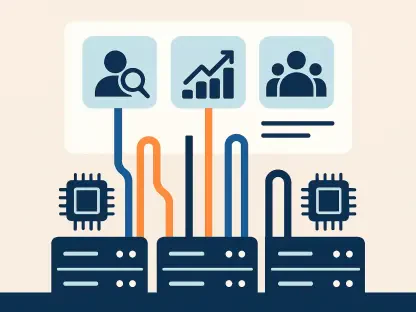Picture a business landscape where every operational detail is laid bare, inefficiencies are exposed in real time, and workflows are optimized with surgical precision through the power of data-driven insights. This isn’t a distant dream but the reality brought by process intelligence, a transformative approach that’s redefining how enterprises function in a competitive world. By tapping into advanced tools, companies can gather critical data, analyze it deeply, and uncover actionable insights to streamline processes and drive meaningful change. This article explores the forefront of this revolution, spotlighting 11 leading process intelligence platforms that are empowering organizations to innovate, enhance efficiency, and maintain a competitive edge. As businesses face mounting pressure to adapt quickly, these tools are not just optional but essential for survival and growth. Dive in to discover how they’re shaping the future of operational excellence and why they matter now more than ever in the journey of business transformation.
The Rising Importance of Process Intelligence in Today’s Market
In an era where speed and efficiency dictate success, process intelligence has emerged as a cornerstone for organizations aiming to stay ahead. Far beyond traditional process management, this approach offers a sophisticated lens into operations, revealing hidden bottlenecks and untapped opportunities for improvement. Recent data from the PEX Report underscores this momentum, showing that 23% of surveyed companies already rely on these tools for transformation, while another 22% plan to invest within the coming year. This growing adoption signals a clear recognition of the strategic value these platforms bring to the table, enabling firms to make informed decisions that fuel both innovation and profitability. As markets become increasingly dynamic, the ability to visualize and refine workflows through data is no longer a luxury but a fundamental need for businesses striving to maintain relevance and agility in their respective industries.
The significance of process intelligence lies in its capacity to deliver more than just surface-level insights. Unlike older methodologies that merely scratched the surface, modern tools dig deeper, uncovering value that directly impacts bottom lines and customer satisfaction. They empower companies to shift from reactive problem-solving to proactive optimization, ensuring resources are allocated where they matter most. This shift is particularly crucial as industries grapple with complex challenges like supply chain disruptions and digital transformation pressures. By providing a clear, data-backed view of operations, process intelligence helps bridge the gap between current inefficiencies and future aspirations, setting the stage for sustainable growth. As this technology continues to gain traction, its role in driving strategic initiatives becomes ever more apparent, positioning it as a vital asset for forward-thinking enterprises.
Evolving Focus of Process Intelligence Software
The trajectory of process intelligence software has undergone a remarkable transformation in recent times, moving from vague promises to targeted, results-oriented solutions. Early iterations of these tools often touted general benefits like enhanced visibility without tying them to specific outcomes, leaving businesses guessing about real impact. However, as recent Forrester insights point out, the narrative has pivoted sharply toward concrete use cases. Today’s platforms are designed to address precise needs—whether it’s slashing expenses tied to AI agent deployment, refining supply chain logistics, or elevating customer experiences to new heights. This focus on measurable results reflects a broader market demand for tools that don’t just inform but actively contribute to solving pressing business challenges, making them indispensable in a landscape increasingly driven by data and AI integration.
This evolution isn’t merely cosmetic; it represents a fundamental shift in how process intelligence aligns with organizational goals. Vendors now craft features and packages tailored to specific industries and pain points, ensuring that their offerings resonate with real-world applications. For instance, the emphasis on grounding AI initiatives with reliable process data highlights the critical role these tools play in supporting emerging technologies. Companies are no longer content with abstract benefits; they seek platforms that can demonstrate clear value, whether through cost savings or improved operational flow. As a result, process intelligence software has become a linchpin for transformation strategies, enabling businesses to navigate complexities with confidence and precision. This trend toward specificity and accountability is reshaping expectations, pushing vendors to innovate continuously and deliver solutions that meet the exacting demands of modern enterprises.
Core Capabilities That Define Leading Platforms
When examining the landscape of process intelligence tools, certain shared characteristics stand out as hallmarks of their effectiveness. Most of these platforms leverage the power of AI and process mining to construct digital twins—virtual replicas of business operations—that illuminate inefficiencies, compliance gaps, and areas ripe for enhancement. Their primary objectives often revolve around slashing operational costs, boosting efficiency, and improving customer interactions, making them vital for competitive advantage. Integration with existing infrastructures, such as ERP and CRM systems, is another key strength, ensuring these tools slot seamlessly into current setups. Moreover, fostering collaboration between IT departments and business units is a recurring theme, smoothing the path to holistic transformation and ensuring that insights translate into actionable change across the organization.
Beyond integration, automation and simulation capabilities are central to the appeal of these platforms. These features allow companies to experiment with process adjustments in a risk-free environment before full implementation, minimizing disruptions while maximizing impact. Many tools also pave the way for adopting robotic process automation (RPA) or integrating generative AI, aligning with broader digital trends. This focus on practical, forward-looking functionality underscores a shared mission among the top tools: transforming raw data into strategic decisions that propel businesses forward. From large-scale enterprises to specialized sectors, the emphasis on operational clarity and improvement unites these platforms, offering a robust foundation for tackling today’s challenges. As businesses seek to refine their workflows, these core capabilities provide the tools needed to turn vision into reality with precision and foresight.
Exploring the Diverse Strengths of Key Tools
The array of process intelligence tools available today showcases a remarkable diversity, each tailored to meet distinct organizational needs while driving transformation. Platforms like Celonis lead with their Process Intelligence Graph, a digital twin that unifies operations across systems, making it a powerhouse for enterprise-wide change. ARIS, on the other hand, excels in managing the full process lifecycle with AI-driven mining, particularly suited for regulated sectors needing strict compliance. Tools like Process360 Live by iGrafx prioritize continuous improvement and analytics, while KYP.ai’s Productivity 360 offers a unique blend of process and task mining to enhance workforce experiences. For those embedded in SAP ecosystems, SAP Signavio delivers specialized insights for migrations, ensuring seamless transitions with robust data visualization. This variety ensures that businesses of all shapes can find a tool aligned with their specific operational demands.
Further diversity is evident in platforms like Appian, which merges low-code development with industry-focused solutions, and Apromore, whose open-source foundation appeals to financial services seeking ongoing refinement. IBM Process Mining caters to midsize and larger firms with visual models derived from event logs, while ABBYY Timeline democratizes access with user-friendly, cloud-based features for non-technical staff. Meanwhile, mpmX by MEHRWERK champions flexibility through modular, AI-enhanced designs to avoid vendor lock-in, and UiPath Discovery Suite zeros in on identifying automation potential for continuous optimization. Each tool carves out a niche, whether through industry focus, ease of use, or integration capabilities, reflecting the broad spectrum of challenges businesses face. This rich selection empowers companies to select a solution that not only addresses immediate needs but also supports long-term strategic goals with tailored precision.
Trends Steering the Future of Process Intelligence
Analysts from Forrester and Gartner consistently highlight process intelligence as a critical component of digital transformation, with several trends pointing to its future direction. A prominent development is the deep integration of AI, which amplifies these tools’ ability to provide predictive insights and prepare organizations for automation at scale. This technological advancement allows for more than just analysis; it enables anticipation of issues before they arise, transforming reactive approaches into proactive strategies. Additionally, there’s a noticeable shift toward user accessibility, with platforms like ABBYY Timeline catering to those without technical expertise, broadening the reach of process intelligence across departments. Open architectures, as seen in mpmX, also gain traction by offering flexibility and reducing dependency on single vendors, addressing a key concern for many enterprises navigating complex tech ecosystems.
Another defining trend is the move away from generic benefits toward highly specific use cases that deliver tangible outcomes. Businesses now demand tools that solve particular problems—be it compliance in regulated industries or automation in high-volume operations—rather than offering broad, undefined improvements. This demand for customization is likely to deepen, with future innovations expected to focus on even more niche applications and tighter integration with cutting-edge technologies like generative AI. The adaptability of these tools to diverse needs, from enterprise giants to specialized sectors, underscores their growing relevance. As the market evolves, the emphasis on tailored solutions and enhanced usability will continue to shape how process intelligence supports business goals, promising a landscape where precision and innovation go hand in hand to meet the challenges of tomorrow.
Reflecting on the Impact and Next Steps for Adoption
Looking back, the journey of process intelligence tools reveals a market that has matured rapidly, driven by a relentless focus on AI and measurable business outcomes. These platforms have carved out a space where operational visibility turns into actionable results, helping countless organizations cut costs, streamline workflows, and enhance customer experiences. From digital twins to simulation capabilities, the shared features of these tools tackle inefficiencies head-on, while their diverse strengths cater to a wide array of industry needs. The shift toward specific use cases marks a pivotal moment, ensuring that businesses reap real benefits rather than chasing vague promises, as evidenced by the tailored approaches of each platform in addressing unique challenges.
Moving forward, companies aiming to harness this potential should prioritize aligning tool selection with their specific operational goals, whether compliance, automation, or large-scale transformation. Evaluating integration capabilities with existing systems remains crucial to avoid silos and ensure seamless adoption. Additionally, staying attuned to emerging trends like deeper AI integration will prepare businesses for the next wave of innovation. Engaging cross-functional teams during implementation can further maximize impact, bridging IT and business perspectives for cohesive outcomes. As the landscape continues to evolve, taking these strategic steps will position enterprises to leverage process intelligence not just as a tool, but as a catalyst for sustained growth and adaptability in an ever-changing market.









